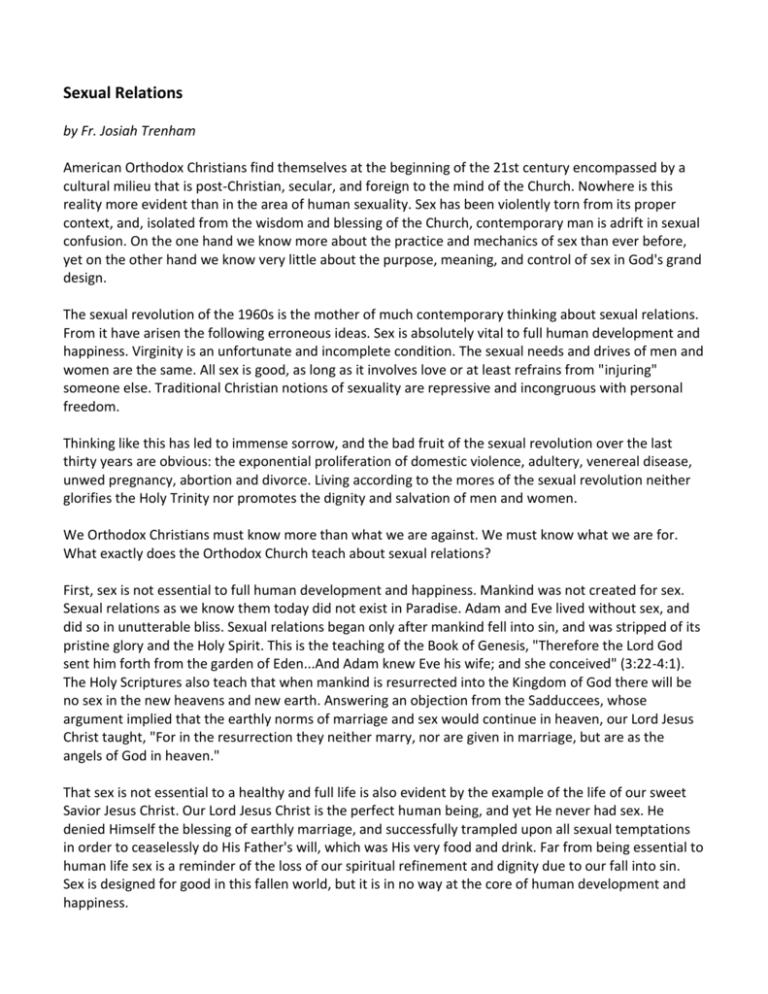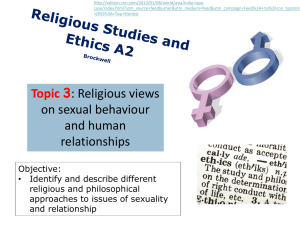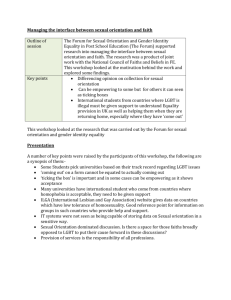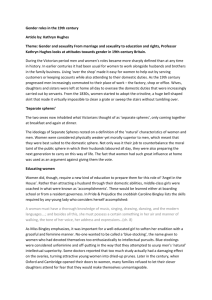
Sexual Relations
by Fr. Josiah Trenham
American Orthodox Christians find themselves at the beginning of the 21st century encompassed by a
cultural milieu that is post-Christian, secular, and foreign to the mind of the Church. Nowhere is this
reality more evident than in the area of human sexuality. Sex has been violently torn from its proper
context, and, isolated from the wisdom and blessing of the Church, contemporary man is adrift in sexual
confusion. On the one hand we know more about the practice and mechanics of sex than ever before,
yet on the other hand we know very little about the purpose, meaning, and control of sex in God's grand
design.
The sexual revolution of the 1960s is the mother of much contemporary thinking about sexual relations.
From it have arisen the following erroneous ideas. Sex is absolutely vital to full human development and
happiness. Virginity is an unfortunate and incomplete condition. The sexual needs and drives of men and
women are the same. All sex is good, as long as it involves love or at least refrains from "injuring"
someone else. Traditional Christian notions of sexuality are repressive and incongruous with personal
freedom.
Thinking like this has led to immense sorrow, and the bad fruit of the sexual revolution over the last
thirty years are obvious: the exponential proliferation of domestic violence, adultery, venereal disease,
unwed pregnancy, abortion and divorce. Living according to the mores of the sexual revolution neither
glorifies the Holy Trinity nor promotes the dignity and salvation of men and women.
We Orthodox Christians must know more than what we are against. We must know what we are for.
What exactly does the Orthodox Church teach about sexual relations?
First, sex is not essential to full human development and happiness. Mankind was not created for sex.
Sexual relations as we know them today did not exist in Paradise. Adam and Eve lived without sex, and
did so in unutterable bliss. Sexual relations began only after mankind fell into sin, and was stripped of its
pristine glory and the Holy Spirit. This is the teaching of the Book of Genesis, "Therefore the Lord God
sent him forth from the garden of Eden...And Adam knew Eve his wife; and she conceived" (3:22-4:1).
The Holy Scriptures also teach that when mankind is resurrected into the Kingdom of God there will be
no sex in the new heavens and new earth. Answering an objection from the Sadduccees, whose
argument implied that the earthly norms of marriage and sex would continue in heaven, our Lord Jesus
Christ taught, "For in the resurrection they neither marry, nor are given in marriage, but are as the
angels of God in heaven."
That sex is not essential to a healthy and full life is also evident by the example of the life of our sweet
Savior Jesus Christ. Our Lord Jesus Christ is the perfect human being, and yet He never had sex. He
denied Himself the blessing of earthly marriage, and successfully trampled upon all sexual temptations
in order to ceaselessly do His Father's will, which was His very food and drink. Far from being essential to
human life sex is a reminder of the loss of our spiritual refinement and dignity due to our fall into sin.
Sex is designed for good in this fallen world, but it is in no way at the core of human development and
happiness.
Second, consecrated virginity is the highest way of life. Far from being an unfortunate and incomplete
way of life, chastity is the highest expression of love and devotion to God. Such a life has only been
made possible by the ennobling of human nature by the Incarnation, Death, Resurrection, and Ascension
of our Lord Jesus Christ, and by the outpouring of the Holy Spirit on human flesh on the Holy Day of
Pentecost.
Since that time humanity has been radically changed, altered, and unshackled from earthly attachments.
The Church's virgins, most typically our monks and nuns, are the very proof of the presence of the
Kingdom of God on earth and a sign of contradiction and hope in this fallen world. When St. Athanasius
the Great was asked by a skeptic to prove that Jesus had brought the Kingdom of God to earth, he
answered by pointing to the virgins of the Church as the irrefutable proof of the presence of the
Kingdom of God on earth.
Prior to the Incarnation of our Master Jesus Christ, life long virginity as we have it today in the Church
was unheard of. Our Lord Jesus Christ recommended and modeled such a life, as did the Great Apostle
Paul. Our greatest saints, the Most Pure Theotokos and Ever-Virgin Mary and the Holy Forerunner and
Baptist John, while honoring the noble estate of marriage and its sexual components, renounced sexual
relations and consecrated their chastity to God's service.
Since that time until today an innumerable multitude of virginal saints have filled our One, Holy, Catholic
and Apostolic Church. Anyone who can successfully embrace such a beautiful way of life should, and in
so doing wed not an earthly bride or bridegroom, but Jesus Christ Himself. Even for those with the gift of
marriage virginity is a precious treasure to be guarded and bestowed in tact as a love offering to one's
spouse, with whom one is first joined in the Mystery of Christian marriage.
Third, sexual relations are good only when used according to God's design. God has designed sexual
relations for three basic reasons: to avoid fornication, to unite the husband and wife as a powerful
adhesive, and to bring forth children to be raised to worship God and for the upbuilding of the Church.
St. Paul wrote, "It is good for a man not to touch a woman. Nevertheless, to avoid fornication, let every
man have his own wife, and let every woman have her own husband."
Since our fall from grace our passions have been disordered. For most people this disorder is particularly
noticeable in powerful sexual drives.
Sexual relations in marriage provide a safe and calm harbor to tame and redirect these unruly passions
and desires. Sexual relations are also designed to serve as marital glue. "For this cause shall a man leave
father and mother, and shall cleave to his wife: and the two shall become one flesh." The physical union
of intercourse is designed to strengthen the marital bond by both enacting a very real physical unity and
by producing a child, who is a creation not from only husband or wife alone, buy from both the husband
and wife together.
For this reason this powerful sexual relation is not to be accomplished with anyone but one's God-given
spouse. Sexual relations are also designed to bring forth children. For the married sexual relations are
not only an unspeakable blessing but one of the main ways to fulfill God's commandment to "be fruitful
and multiply." The procreation of children is the duty of Christian spouses, and can no more be avoided
or tampered with than can the other purposes of sexual relations.
Those not prepared to assume the responsibility of sexual relations ought not engage in them. The
intense pleasure of sexual relations are designed by God to promote the procreation of children, since
the difficulties inherent in childbearing and Christian parenting might otherwise tempt spouses to avoid
this solemn responsibility.
Today's contraception culture strikes at the heart of the God-designed unity of pleasure and
responsibility, opting to embrace pleasure while avoiding the responsibility of childbearing and calling it
"family planning." Such planned parenthood and family planning is in reality planned barrenhood and
family banning, and as such has been vigorously forbidden by the Holy Fathers throughout the history of
the Church. St. Paul teaches that married women find their salvation in and through childbearing.
Having documented what the Church says is the God designed purpose of sexual relations let us
conclude by noting what sexual practices are clearly outside that purpose, and thus are sinful.
Homosexual relations are forbidden as a perversion of the created order, and as an assault upon Godordained heterosexual marriage. Persons with strong homosexual dispositions, that have proved
resistant to reorientation, are urged by Christ to struggle against this passion in the embrace of chastity,
and, if at all possible, to enter the monastic vocation where life can be lived in a community of persons.
Masturbation is censured as self-abuse, the waste of seed and its procreative intent, and an improper
turning inward and rejection of the marital context of sexuality. It is always sinful.
Sexual relations prior to marriage are strongly condemned as fornication, a sacrilegious defilement of
the Temple of the Holy Spirit, a defrauding of one's future spouse, and are detrimental to the
development of a stable future marriage. It is no coincidence that the rise in pre-marital sex has been
paralleled by the rise in divorce and marital unhappiness. To take the very sublime things of marriage
out of their context of grace, perpetual commitment, and the Church's blessings is a recipe for disaster.
Marriage itself does not make legitimate all forms of sexuality. The sexual intercourse of the married is
to be modest, and within its proper limits. Moderation is determined both by regulation of time and
method of sexual relations. Relations on fast days, on the eve prior to one's reception of Holy
Communion, and on days on which one receives the Holy Gifts are forbidden as an illegitimate
indulgence to the flesh. Anal and oral intercourse, as well as the use of pornography and sexual toys, are
sexual perversions and are always sinful, even for married Christians. The unnatural prolongation of
sexual desire, through the use of drugs such as viagra, is forbidden. On the contrary, such decline in
sexual desire is to warmly welcomed by aging Orthodox Christians as a divine help in one's life long
preparation for departure from this life.








